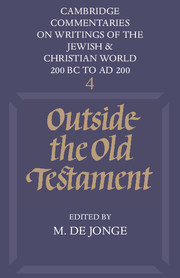Book contents
- Frontmatter
- Contents
- General Editors' Preface
- Editor's Foreword
- Acknowledgements
- Abbreviations
- General Introduction
- Pseudo-Philo, Liber Antiquitatum Biblicarum
- The Ethiopic Book of Enoch
- The Testament of Abraham
- The Testaments of the Twelve Patriarchs
- Joseph and Aseneth
- The Book of Jubilees
- The Testament (Assumption) of Moses
- The Psalms of Solomon
- The Martyrdom of Isaiah
- The Syriac Apocalypse of Baruch
- Paraleipomena Jeremiou
- The Testament of Job
- Index
The Psalms of Solomon
Published online by Cambridge University Press: 05 June 2012
- Frontmatter
- Contents
- General Editors' Preface
- Editor's Foreword
- Acknowledgements
- Abbreviations
- General Introduction
- Pseudo-Philo, Liber Antiquitatum Biblicarum
- The Ethiopic Book of Enoch
- The Testament of Abraham
- The Testaments of the Twelve Patriarchs
- Joseph and Aseneth
- The Book of Jubilees
- The Testament (Assumption) of Moses
- The Psalms of Solomon
- The Martyrdom of Isaiah
- The Syriac Apocalypse of Baruch
- Paraleipomena Jeremiou
- The Testament of Job
- Index
Summary
Title
‘Psalms of Solomon’ is the title given to a collection of eighteen psalms preserved in Greek and Syriac but in all probability originally composed in Hebrew. All but the first have a superscription which mentions Solomon as author, but nothing in these songs warrants an ascription to the famous son of David. They are not even pseudepigraphical in the usual sense of the word. The psalms proper do not hint at any connection with Solomon and the circumstances in which he reigned. They need not have originated at the same time and may have been composed by more than one author. At a certain moment they were brought together to be used in assemblies of pious Jews (mentioned e.g. in 8:23f; 17:16, 32, 43) for meditation, prayer, instruction, perhaps also to be sung (see the superscriptions of Psalms 10, 14, 16 and 17). To give them some authority the collector(s) attached Solomon's name to the individual psalms and to the collection. After all he was reported to have composed 1,005 songs (1 Kings 4:32 (5:12). This is the number in the Hebrew text; the lxx has 5,000) and the regular Psalter contained only two psalms bearing Solomon's name (Pss. 72, 127). The fact that Psalms 17 and 18 in this collection hope for a wise and pious king from the family of David may have suggested the connection with David's successor. In the Syriac tradition the Psalms were handed down together with (and after) 42 Odes of Solomon, an entirely different collection of hymns.
- Type
- Chapter
- Information
- Outside the Old Testament , pp. 159 - 177Publisher: Cambridge University PressPrint publication year: 1986



